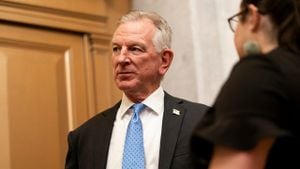Former President Donald Trump is gearing up for his new administration with some notable appointments to his Cabinet. With the recent announcement, Trump's choices are raising eyebrows and stirring discussions across the nation, especially among political analysts and citizens alike. The former president has opted to bring familiar faces and some unexpected selections to key positions.
One of the most prominent nominations is Marco Rubio, the U.S. Senator from Florida, who has been selected as Trump's pick for Secretary of State. Known for his extensive experience in foreign affairs, Rubio faced prior challenges during the 2016 election, but his ability to unite different factions within the GOP could prove beneficial for the new administration.

While Rubio's past as both a critic and supporter of Trump raises questions, his nomination signals Trump's intention to pull together various elements of the Republican Party. Analysts suggest Rubio's Senate experience and connections could help mend divisions within the party, especially when addressing foreign relations.
Trump has also turned to former Representative Tulsi Gabbard for the role of Director of National Intelligence. A controversial figure within her own party, Gabbard has shifted her alignment multiple times, making this appointment particularly intriguing for those examining Trump’s strategy to diversify voices within his administration.

Gabbard, who gained national attention for her unfiltered approach to politics and foreign policy, is seen as both refreshing and polarizing. Some believe her fresh viewpoints could provide necessary insights, particularly on progressive issues, potentially attracting younger voters and those outside traditional party lines. Nevertheless, her nomination raises concerns about her alignment on intelligence-related matters.
Beyond these key figures, Trump announced the appointment of Rep. Mike Waltz as National Security Adviser and former senior advisor Stephen Miller as Homeland Security advisor. These selections suggest Trump’s commitment to maintaining his hardline stance on immigration and national security, issues he campaigned heavily on during his previous administration.
Miller, who has long been viewed as one of Trump’s most loyal allies, is known for advocating stringent policies aimed at reducing illegal immigration. His return to the White House could indicate Trump's approach to immigration will remain uncompromising, much to the delight of his base.
Meanwhile, Waltz's experience as a former Green Beret and current congressman adds military insight to Trump’s national security team. His background may aid the administration's focus on defense and security initiatives, particularly as global tensions continue.
Another notable appointment is Rep. Elise Stefanik as U.N. Ambassador, signaling Trump’s preference for individuals who are vocally supportive of his policies. Stefanik's history of challenging the status quo can resonate well with Trump's agenda, potentially enhancing the U.S.'s standing among other nations—or causing more friction, depending on how her policies align with international relations.

Many people are watching closely the dynamic shifting within the Cabinet, anticipating the new administration’s direction. While Trump has pledged to unite the party, there are clashing interests within GOP factions. The balancing act between opposing viewpoints will likely be a focal point for Trump if he wants to fulfill his promise of bipartisan cooperation.
All of these new appointments come amid significant political polarization, and Trump’s approach to governance hasn’t softened since his 2016 campaign. With criticisms about his past administration’s handling of various issues still fresh, it remains to be seen how these selections will pan out and if they can effectively guide the country forward.
The ramifications of these appointments could redefine not just Trump’s administration but also the Republican Party’s future. The success of the proposed policies by these nominees will be closely monitored by both supporters and detractors alike. Political analysts are eagerly speculating how well they will work under the pressure of Washington politics.
While some believe these appointments reflect Trump’s intent to maintain his core base, others argue it demonstrates a strategy to integrate broader perspectives within his administration. How well he manages these dynamics will shape the narrative of his presidential legacy.
With his Cabinet taking shape, former President Trump seems poised to lead with voices familiar to his circle but also with names bringing fresh perspectives and controversies along for the ride. The effectiveness of this blend of experience and new ideas will be tested as the country inevitably moves toward addressing the pressing issues it faces.



